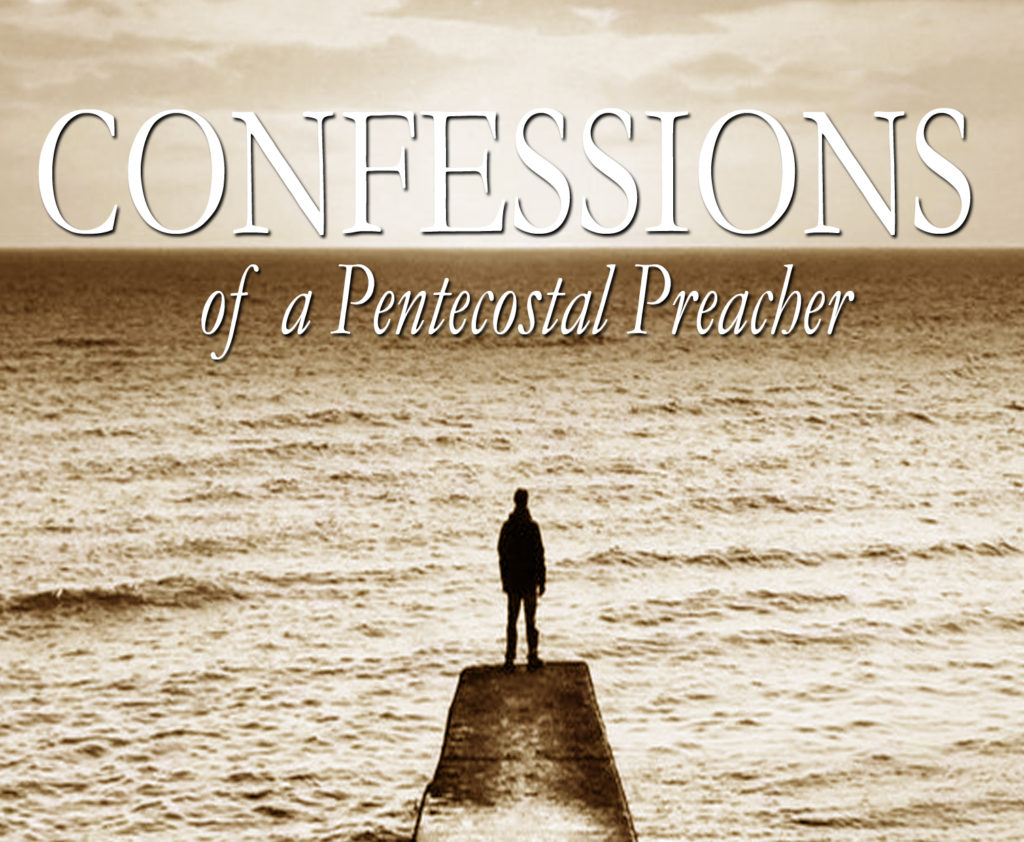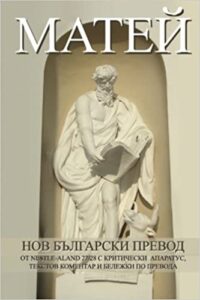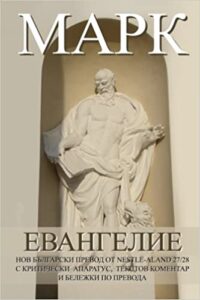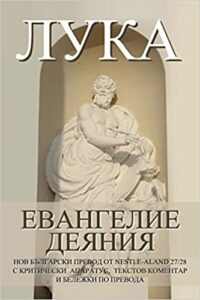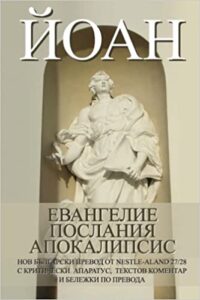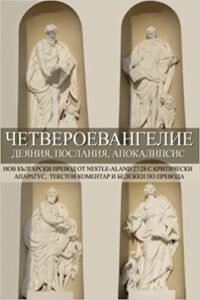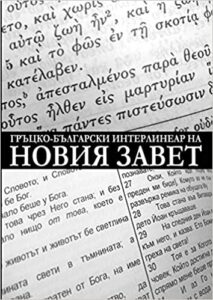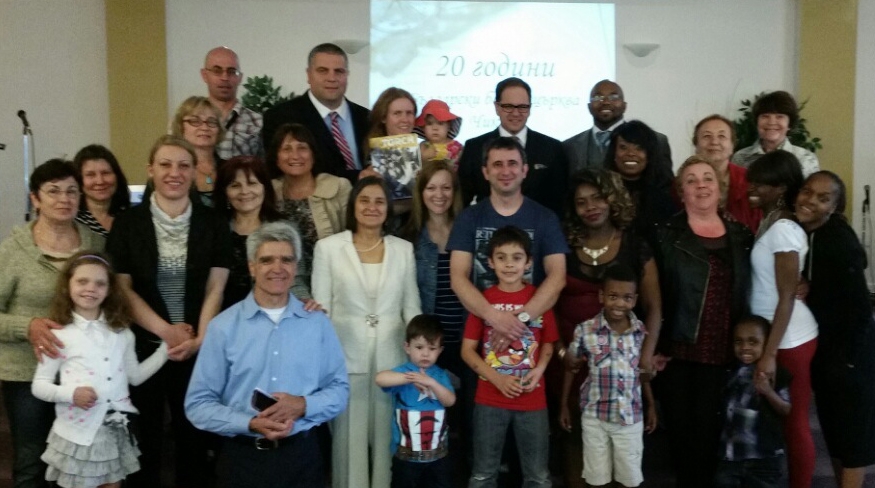30 Years of Miracles: 2019
In the year 2019, our book on missions was finalized. The originally envisioned 7 years of missional work in Bulgaria, had turned to almost 15 or roughly half of our ministry. Yet, the final touches needed to be made with transcripts and documents from several organizations in Bulgaria which, had meanwhile ceased. When these rather detail and legal clarifications were finally made, our book was ready to print for Christmas of 2019.
However, during this time the first COVID reports began coming in from around the world. First, from Wuhan, China at the end of 2019 and then from Israel, which was among the first to recognize and respond to the virus pandemic. With this information in, we called an emergency meeting of our ministry leaders in anticipation for a national state of emergency in Bulgaria and abroad. At the same time, we had an anointed service in Alabama at the end of 2019 and another good one in South Carolina at the start of 2020, all while praying and fasting with our teams for a clear direction from the Lord. In fact, after finalizing our response strategy we decided to initiate it on Bulgaria’s national holiday on March 3, 2020. Only 10 days later, the United States declared a state of national emergency and the Bulgarian government followed with the same shortly. Though all business and churches were under complete lockdown in Bulgaria for the next 200 days, our teams were able to implement the measures we have taken and continue to do ministry in Bulgaria and abroad via various alternative venues.
This book should have been published seven years ago in 2013. Its original subtitle was going to read “7 Years in Bulgaria.” Instead, it took seven years to finish it with all documents, research archives and new cases. Now, it is finally here and it finally reads like a story – not just choppy interviews, deposition documented testimonies or court records, but a story of struggle, strength and solitude. A story of life and a story of us.
1995-96 The establishing of the first Bulgarian Church of God in Chicago and its first split
2000-01 The contracted building of the ministry center for the Central Church of God in Sofia
2002-03 The church split in Southaven and what followed next
2005-06 The post-communist split of the Bulgarian Church of God and consecutive sub-denominations
2010-13 The social media network that cost us millions (of souls)
2016 The vote that forced to kill a church
2019-20 The sale of the ministry center for the Central Church of God in Bulgaria
READ: CONFESSIONS of a Pentecostal Preacher
CONFESSIONS of a Pentecostal Preacher
To Mark Alan
We know not why good people have to die,
but we do know we must tell their story…
Chapter I: Beyond the Church and into God
Be without fear in the face of your enemies.
Be brave and upright that God may love thee.
Speak the truth always, even if it leads to your death.
Safeguard the helpless and do no wrong.
That is your oath.
~Kingdom of Heaven (2005)
Separation of church from politics of false religiosity
The phone rang heavy and long. It was 4 AM in Bulgaria, but I was already up. A friend on the other end of the line was calling from South Carolina with a warning of some bad situation. The following morning, I was going to be contacted by the Director questioning why we were ministering in churches outside of our denomination.
The truth was we had ministered in some 300 local churches across the Balkan country of Bulgaria crossing all denominational boundaries and gathering youth from just about every confession. God had used us not only to reach and minister and to lead, but to step into an untouched spiritual realm, to undertake an unfamiliar ministry paradigm and to approach a brand new dimension of reality where He was to be the center of it all. And we had obeyed without questions. Now it was time to pay the price!
* * *
Our denomination, the one to which I remain both critically loyal and loyally critical, spreads over some five generations. Through its century old existence, the struggles and tension between theology and praxis has been in the center. And there, in the very essence of Pentecostalism itself, while some are always celebrating and being celebrated in the office or temple, others are always pushed in the periphery of normal life, hidden from the world behind closed doors and seeking a much deeper experience with God.
These modern day mystics are not only forgotten, but often forbidden. For their riot for righteousness cannot be conceived, contained and controlled by the religious norms of organized officiality. They speak as prophets to a world they so fervently try to escape from, about a reality that does not exist in the normal believer’s mindset. A stage of spirituality that cannot be preached without being lived in the social existence. And a relationship of God that goes far beyond common relationism and into God himself. That God, Who does not abide in offices and temples, but on the cross outside of the city walls…
But I knew nothing of this until that cold winter morning when the phone rang through darkness of the night. Knowing what is coming, rarely changes what we have done to get here.
7 Years in Bulgaria: CONFESSIONS of a Pentecostal Preacher
by Dony K. Donev, D.Min.
Upcoming Releases for United States (October, 2020)
30 Years of Miracles: 2018
The greatest miracles in life come when we are the least prepared for them. And they never leave us!
This book should have been published seven years ago in 2013. Its original subtitle was going to read “7 Years in Bulgaria.” Instead, it took seven years to finish it with all documents, research archives and new cases. Now, it is finally here and it finally reads like a story – not just choppy interviews, deposition documented testimonies or court records, but a story of struggle, strength and solitude. A story of life and a story of us.
1995-96 The establishing of the first Bulgarian Church of God in Chicago and its first split
2000-01 The contracted building of the ministry center for the Central Church of God in Sofia
2002-03 The church split in Southaven and what followed next
2005-06 The post-communist split of the Bulgarian Church of God and consecutive sub-denominations
2010-13 The social media network that cost us millions (of souls)
2016 The vote that forced to kill a church
2019-20 The sale of the ministry center for the Central Church of God in Bulgaria
READ: CONFESSIONS of a Pentecostal Preacher
CONFESSIONS of a Pentecostal Preacher
To Mark Alan
We know not why good people have to die,
but we do know we must tell their story…
Chapter I: Beyond the Church and into God
Be without fear in the face of your enemies.
Be brave and upright that God may love thee.
Speak the truth always, even if it leads to your death.
Safeguard the helpless and do no wrong.
That is your oath.
~Kingdom of Heaven (2005)
Separation of church from politics of false religiosity
The phone rang heavy and long. It was 4 AM in Bulgaria, but I was already up. A friend on the other end of the line was calling from South Carolina with a warning of some bad situation. The following morning, I was going to be contacted by the Director questioning why we were ministering in churches outside of our denomination.
The truth was we had ministered in some 300 local churches across the Balkan country of Bulgaria crossing all denominational boundaries and gathering youth from just about every confession. God had used us not only to reach and minister and to lead, but to step into an untouched spiritual realm, to undertake an unfamiliar ministry paradigm and to approach a brand new dimension of reality where He was to be the center of it all. And we had obeyed without questions. Now it was time to pay the price!
* * *
Our denomination, the one to which I remain both critically loyal and loyally critical, spreads over some five generations. Through its century old existence, the struggles and tension between theology and praxis has been in the center. And there, in the very essence of Pentecostalism itself, while some are always celebrating and being celebrated in the office or temple, others are always pushed in the periphery of normal life, hidden from the world behind closed doors and seeking a much deeper experience with God.
These modern day mystics are not only forgotten, but often forbidden. For their riot for righteousness cannot be conceived, contained and controlled by the religious norms of organized officiality. They speak as prophets to a world they so fervently try to escape from, about a reality that does not exist in the normal believer’s mindset. A stage of spirituality that cannot be preached without being lived in the social existence. And a relationship of God that goes far beyond common relationism and into God himself. That God, Who does not abide in offices and temples, but on the cross outside of the city walls…
But I knew nothing of this until that cold winter morning when the phone rang through darkness of the night. Knowing what is coming, rarely changes what we have done to get here.
7 Years in Bulgaria: CONFESSIONS of a Pentecostal Preacher
by Dony K. Donev, D.Min.
Upcoming Releases for United States (October, 2020)
30 Years of Miracles: 2017
If 2016 was a final preparatory year, in many ways 2017 was a closing year in light of several future events concluding with the 500th anniversary of the Reformation. We had no clue that in just a few short months, God will visit us with a series of Last Days Revivals that we personally have not observed as far back as 1999.
Different than recent years, where prolonged single revival were extended in one single locations, this was a new approach where the Spirit of God was moving from one location to another independent from any organized schedule. We simply agreed to follow wherever He leads us:
01/15/2017 AM Church at the Well in Cullman, AL
02/03/2017 AM Good Shepherd Church of God in Pahokee, FL
02/26/2017 AM Grace Pointe Church of God in New Albany, MS
03/12/2017 PM Gray Court Church of God in Gray Court, SC
03/15/2017 PM Laurens Church of God in Laurens, SC
03/29/2017 PM Cheraw Church of God in Cheraw, SC
04/02/2017 AM Vineyard Church of God in Spartanburg, SC
04/09/2017 AM Kinser Church of God in Cleveland, TN
04/23/2017 PM Joanna Church of God in Joanna, SC
05/07/2017 AM La France Church of God in La France, SC
06/04/2017 AM River Hills Church of God in Ocoee, TN
Our 2017 schedule resembled the list and intensity of revivals we preached in the Summer of 1999 so closely that we pulled our records from back then and began calling churches were we preached 20 years ago. The response was simply overwhelming.
After over six-months of non-stop travel, we departed to Bulgaria where our schedule remained as strenuous. Nevertheless, with Tetraevangelion in the new Bulgarian Bible translation ready, the complete New Testament Greek – Bulgarian Interlinear was set for print in the Fall of 2017. We presented the first 95 copies in Sofia on October 31, 2017 for the 500th Anniversary of the Protestant Reformation.
This book should have been published seven years ago in 2013. Its original subtitle was going to read “7 Years in Bulgaria.” Instead, it took seven years to finish it with all documents, research archives and new cases. Now, it is finally here and it finally reads like a story – not just choppy interviews, deposition documented testimonies or court records, but a story of struggle, strength and solitude. A story of life and a story of us.
1995-96 The establishing of the first Bulgarian Church of God in Chicago and its first split
2000-01 The contracted building of the ministry center for the Central Church of God in Sofia
2002-03 The church split in Southaven and what followed next
2005-06 The post-communist split of the Bulgarian Church of God and consecutive sub-denominations
2010-13 The social media network that cost us millions (of souls)
2016 The vote that forced to kill a church
2019-20 The sale of the ministry center for the Central Church of God in Bulgaria
READ: CONFESSIONS of a Pentecostal Preacher
CONFESSIONS of a Pentecostal Preacher
To Mark Alan
We know not why good people have to die,
but we do know we must tell their story…
Chapter I: Beyond the Church and into God
Be without fear in the face of your enemies.
Be brave and upright that God may love thee.
Speak the truth always, even if it leads to your death.
Safeguard the helpless and do no wrong.
That is your oath.
~Kingdom of Heaven (2005)
Separation of church from politics of false religiosity
The phone rang heavy and long. It was 4 AM in Bulgaria, but I was already up. A friend on the other end of the line was calling from South Carolina with a warning of some bad situation. The following morning, I was going to be contacted by the Director questioning why we were ministering in churches outside of our denomination.
The truth was we had ministered in some 300 local churches across the Balkan country of Bulgaria crossing all denominational boundaries and gathering youth from just about every confession. God had used us not only to reach and minister and to lead, but to step into an untouched spiritual realm, to undertake an unfamiliar ministry paradigm and to approach a brand new dimension of reality where He was to be the center of it all. And we had obeyed without questions. Now it was time to pay the price!
* * *
Our denomination, the one to which I remain both critically loyal and loyally critical, spreads over some five generations. Through its century old existence, the struggles and tension between theology and praxis has been in the center. And there, in the very essence of Pentecostalism itself, while some are always celebrating and being celebrated in the office or temple, others are always pushed in the periphery of normal life, hidden from the world behind closed doors and seeking a much deeper experience with God.
These modern day mystics are not only forgotten, but often forbidden. For their riot for righteousness cannot be conceived, contained and controlled by the religious norms of organized officiality. They speak as prophets to a world they so fervently try to escape from, about a reality that does not exist in the normal believer’s mindset. A stage of spirituality that cannot be preached without being lived in the social existence. And a relationship of God that goes far beyond common relationism and into God himself. That God, Who does not abide in offices and temples, but on the cross outside of the city walls…
But I knew nothing of this until that cold winter morning when the phone rang through darkness of the night. Knowing what is coming, rarely changes what we have done to get here.
7 Years in Bulgaria: CONFESSIONS of a Pentecostal Preacher
by Dony K. Donev, D.Min.
Upcoming Releases for United States (October, 2020)
30 Years of Miracles: 2016
The year 2016 in many ways was a preparatory one. We had completed several major milestones in Bulgaria in the last two years. Now plans that have been set in motion for our ministry.
First off, the 500th Anniversary of the Reformation planned for 2017 marked a key conclusion of a long translation journey. After publishing the New Bulgarian Translation of the New Testament in small portions in 2007, it was time to put it all together. We had already printed, both in Europe and the Americas a complete Tetraevangelion in the Bulgarian vernacular:
- John and the Johannine Corpus (Gospel, Epistles and Apocalypse)
- Mark
- Matthew
- And finally, the Gospel of Luke and Acts.
Also in the preparatory works for 2016 were the Bulgarian churches in Arizona and California following our AZS quarter vision and the Divine Connections.TV. But the real works were still in the making. The Lord had in store even more we had no clue about. After a full year of preparation in 2016, the year 2017 was going to start with a major series of Last Days Revivals.
This book should have been published seven years ago in 2013. Its original subtitle was going to read “7 Years in Bulgaria.” Instead, it took seven years to finish it with all documents, research archives and new cases. Now, it is finally here and it finally reads like a story – not just choppy interviews, deposition documented testimonies or court records, but a story of struggle, strength and solitude. A story of life and a story of us.
1995-96 The establishing of the first Bulgarian Church of God in Chicago and its first split
2000-01 The contracted building of the ministry center for the Central Church of God in Sofia
2002-03 The church split in Southaven and what followed next
2005-06 The post-communist split of the Bulgarian Church of God and consecutive sub-denominations
2010-13 The social media network that cost us millions (of souls)
2016 The vote that forced to kill a church
2019-20 The sale of the ministry center for the Central Church of God in Bulgaria
READ: CONFESSIONS of a Pentecostal Preacher
CONFESSIONS of a Pentecostal Preacher
To Mark Alan
We know not why good people have to die,
but we do know we must tell their story…
Chapter I: Beyond the Church and into God
Be without fear in the face of your enemies.
Be brave and upright that God may love thee.
Speak the truth always, even if it leads to your death.
Safeguard the helpless and do no wrong.
That is your oath.
~Kingdom of Heaven (2005)
Separation of church from politics of false religiosity
The phone rang heavy and long. It was 4 AM in Bulgaria, but I was already up. A friend on the other end of the line was calling from South Carolina with a warning of some bad situation. The following morning, I was going to be contacted by the Director questioning why we were ministering in churches outside of our denomination.
The truth was we had ministered in some 300 local churches across the Balkan country of Bulgaria crossing all denominational boundaries and gathering youth from just about every confession. God had used us not only to reach and minister and to lead, but to step into an untouched spiritual realm, to undertake an unfamiliar ministry paradigm and to approach a brand new dimension of reality where He was to be the center of it all. And we had obeyed without questions. Now it was time to pay the price!
* * *
Our denomination, the one to which I remain both critically loyal and loyally critical, spreads over some five generations. Through its century old existence, the struggles and tension between theology and praxis has been in the center. And there, in the very essence of Pentecostalism itself, while some are always celebrating and being celebrated in the office or temple, others are always pushed in the periphery of normal life, hidden from the world behind closed doors and seeking a much deeper experience with God.
These modern day mystics are not only forgotten, but often forbidden. For their riot for righteousness cannot be conceived, contained and controlled by the religious norms of organized officiality. They speak as prophets to a world they so fervently try to escape from, about a reality that does not exist in the normal believer’s mindset. A stage of spirituality that cannot be preached without being lived in the social existence. And a relationship of God that goes far beyond common relationism and into God himself. That God, Who does not abide in offices and temples, but on the cross outside of the city walls…
But I knew nothing of this until that cold winter morning when the phone rang through darkness of the night. Knowing what is coming, rarely changes what we have done to get here.
7 Years in Bulgaria: CONFESSIONS of a Pentecostal Preacher
by Dony K. Donev, D.Min.
Upcoming Releases for United States (October, 2020)
30 Years of Miracles: 2015
February 1, 2021 by Cup&Cross
Filed under Featured, Missions, News, Publication
Celebrating 25 Years in Global Ministry
Celebrating 20 years of Bulgarian Church of God in Chicago
This book should have been published seven years ago in 2013. Its original subtitle was going to read “7 Years in Bulgaria.” Instead, it took seven years to finish it with all documents, research archives and new cases. Now, it is finally here and it finally reads like a story – not just choppy interviews, deposition documented testimonies or court records, but a story of struggle, strength and solitude. A story of life and a story of us.
1995-96 The establishing of the first Bulgarian Church of God in Chicago and its first split
2000-01 The contracted building of the ministry center for the Central Church of God in Sofia
2002-03 The church split in Southaven and what followed next
2005-06 The post-communist split of the Bulgarian Church of God and consecutive sub-denominations
2010-13 The social media network that cost us millions (of souls)
2016 The vote that forced to kill a church
2019-20 The sale of the ministry center for the Central Church of God in Bulgaria
READ: CONFESSIONS of a Pentecostal Preacher
CONFESSIONS of a Pentecostal Preacher
To Mark Alan
We know not why good people have to die,
but we do know we must tell their story…
Chapter I: Beyond the Church and into God
Be without fear in the face of your enemies.
Be brave and upright that God may love thee.
Speak the truth always, even if it leads to your death.
Safeguard the helpless and do no wrong.
That is your oath.
~Kingdom of Heaven (2005)
Separation of church from politics of false religiosity
The phone rang heavy and long. It was 4 AM in Bulgaria, but I was already up. A friend on the other end of the line was calling from South Carolina with a warning of some bad situation. The following morning, I was going to be contacted by the Director questioning why we were ministering in churches outside of our denomination.
The truth was we had ministered in some 300 local churches across the Balkan country of Bulgaria crossing all denominational boundaries and gathering youth from just about every confession. God had used us not only to reach and minister and to lead, but to step into an untouched spiritual realm, to undertake an unfamiliar ministry paradigm and to approach a brand new dimension of reality where He was to be the center of it all. And we had obeyed without questions. Now it was time to pay the price!
* * *
Our denomination, the one to which I remain both critically loyal and loyally critical, spreads over some five generations. Through its century old existence, the struggles and tension between theology and praxis has been in the center. And there, in the very essence of Pentecostalism itself, while some are always celebrating and being celebrated in the office or temple, others are always pushed in the periphery of normal life, hidden from the world behind closed doors and seeking a much deeper experience with God.
These modern day mystics are not only forgotten, but often forbidden. For their riot for righteousness cannot be conceived, contained and controlled by the religious norms of organized officiality. They speak as prophets to a world they so fervently try to escape from, about a reality that does not exist in the normal believer’s mindset. A stage of spirituality that cannot be preached without being lived in the social existence. And a relationship of God that goes far beyond common relationism and into God himself. That God, Who does not abide in offices and temples, but on the cross outside of the city walls…
But I knew nothing of this until that cold winter morning when the phone rang through darkness of the night. Knowing what is coming, rarely changes what we have done to get here.
7 Years in Bulgaria: CONFESSIONS of a Pentecostal Preacher
by Dony K. Donev, D.Min.
Upcoming Releases for United States (October, 2020)
30 Years of Miracles: 2014
https://www.youtube.com/watch?v=-kHytj8yK8E
Prophetic Message of Over 30 Years Brings Peace in 2014 and Beyond
On November 9, 1989, the Berlin Wall, the physical representation of the Iron Curtain was brought down. The standing shoot-to-kill orders of the border guards fell. It meant the end of the Cold War, a war which was waged on political, economic, and propaganda fronts and it meant the end of the Communist Regime in Bulgaria.
Seven months prior to this historic occasion, a Danish journalist by the name of Johny Noer along with his family came to Bulgaria traveling in a Pilgrim Convoy to share one message. The message which was declared throughout Communist Bulgaria was not well received and many threats against his family were given to the point of arresting him, confiscating his passport, separating him from his nursing wife and children and escorting them out of the country via separate routs. The outlawed message was: “LET MY PEOPLE GO!” He literally shouted it from the roof tops of open air events in which there were thousands of desperate listeners searching for hope of liberation. This message shook the spiritual foundations of Bulgaria forever.
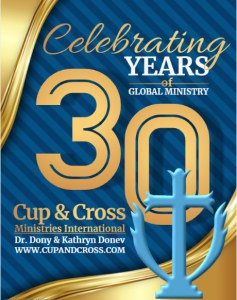
In 2014, exactly 25 years later, our ministry invited brother Noer and his wife to Bulgaria again to proclaim the same message: “LET MY PEOPLE GO!” By miracle, we were successful in getting them into the country even though they had been blacklisted and were not permitted to return. By miracle, we received permission to hold gatherings on election day and by miracle, the funds came just as needed to rent the largest auditorium in the city. The year was 2014 and during one of the many sermons he preached during this revival crusade, along with declaring to “LET MY PEOPLE GO”, a prophetic message was given which was not fully understood until this past year. The message, given in broken English translated into Bulgarian, was exact details of the Corona Virus Pandemic. Astonished by the Word of protection for God’s people, we shared this video clip on social media in 2020. But what astounded us the most was that the video was blocked for containing false information about Covid-19. Over 30 years later this message is still being outlawed by the powers of darkness.
In Exodus 5, when the Israelites brought the words from the Lord and asked to be let go and be able to worship, Pharaoh said, “Who is the LORD that I should obey his voice and let Israel go? I do not know the LORD, and moreover, I will not let Israel go.” But regardless that “Pharaoh” does not know the Lord and forbids worship to the point of arrest and tries to keep God’s people behind the Wall, there is hope in the next part of the story. There is God’s promise for deliverance, the plagues and having to make bricks without straw will be in the past. And no matter the modern-day attempt at censorship, manipulative propaganda or shoot-to-kill silencing orders, we will shout it from the Mountain Tops, “LET MY PEOPLE GO!” We will worship even if we have to go to the wilderness, wherever or whatever that may be. We will shake the spiritual foundations of this country once again.
In the beginning of 2020, the Lord spoke to us what the verse of the year would be for 2021. It is only now that we fully understand its significance. When Jesus appeared to the disciples after His resurrection in John ch. 20, they were hiding behind closed doors in fear. But Jesus came, stood among them and told them “Peace be with you!” This first command for peace and presence calmed fears restoring social order and justice. And in 20:21, Jesus told them again, “Peace be with you”. This second command was a strong imperative salutation to “GO”. Then He breathed on them to receive the Holy Spirit and sent them out as the Father had sent Him.
This year, we are not to live in fear behind closed doors. We shall receive the Resurrecting Power of the Holy Spirit and go out. It is this Power which shall be our covering which Johny Noer spoke of in 1989 and 2014. Today, we have hope of liberation from any Wall, Curtain, Regime or Order. Jesus is amongst us standing undefeated. In 2021, may peace be with you as you stand up to go out declaring “LET MY PEOPLE GO” and do not take no for an answer.
January 1, 2021 Cup & Cross Ministries International, John 20:21
This book should have been published seven years ago in 2013. Its original subtitle was going to read “7 Years in Bulgaria.” Instead, it took seven years to finish it with all documents, research archives and new cases. Now, it is finally here and it finally reads like a story – not just choppy interviews, deposition documented testimonies or court records, but a story of struggle, strength and solitude. A story of life and a story of us.
1995-96 The establishing of the first Bulgarian Church of God in Chicago and its first split
2000-01 The contracted building of the ministry center for the Central Church of God in Sofia
2002-03 The church split in Southaven and what followed next
2005-06 The post-communist split of the Bulgarian Church of God and consecutive sub-denominations
2010-13 The social media network that cost us millions (of souls)
2016 The vote that forced to kill a church
2019-20 The sale of the ministry center for the Central Church of God in Bulgaria
READ: CONFESSIONS of a Pentecostal Preacher
CONFESSIONS of a Pentecostal Preacher
To Mark Alan
We know not why good people have to die,
but we do know we must tell their story…
Chapter I: Beyond the Church and into God
Be without fear in the face of your enemies.
Be brave and upright that God may love thee.
Speak the truth always, even if it leads to your death.
Safeguard the helpless and do no wrong.
That is your oath.
~Kingdom of Heaven (2005)
Separation of church from politics of false religiosity
The phone rang heavy and long. It was 4 AM in Bulgaria, but I was already up. A friend on the other end of the line was calling from South Carolina with a warning of some bad situation. The following morning, I was going to be contacted by the Director questioning why we were ministering in churches outside of our denomination.
The truth was we had ministered in some 300 local churches across the Balkan country of Bulgaria crossing all denominational boundaries and gathering youth from just about every confession. God had used us not only to reach and minister and to lead, but to step into an untouched spiritual realm, to undertake an unfamiliar ministry paradigm and to approach a brand new dimension of reality where He was to be the center of it all. And we had obeyed without questions. Now it was time to pay the price!
* * *
Our denomination, the one to which I remain both critically loyal and loyally critical, spreads over some five generations. Through its century old existence, the struggles and tension between theology and praxis has been in the center. And there, in the very essence of Pentecostalism itself, while some are always celebrating and being celebrated in the office or temple, others are always pushed in the periphery of normal life, hidden from the world behind closed doors and seeking a much deeper experience with God.
These modern day mystics are not only forgotten, but often forbidden. For their riot for righteousness cannot be conceived, contained and controlled by the religious norms of organized officiality. They speak as prophets to a world they so fervently try to escape from, about a reality that does not exist in the normal believer’s mindset. A stage of spirituality that cannot be preached without being lived in the social existence. And a relationship of God that goes far beyond common relationism and into God himself. That God, Who does not abide in offices and temples, but on the cross outside of the city walls…
But I knew nothing of this until that cold winter morning when the phone rang through darkness of the night. Knowing what is coming, rarely changes what we have done to get here.
7 Years in Bulgaria: CONFESSIONS of a Pentecostal Preacher
by Dony K. Donev, D.Min.
Upcoming Releases for United States (October, 2020)
30 Years of Miracles: 2012
MAKING a MOVE that MATTERS
In many ways, 2012 was an off-year.
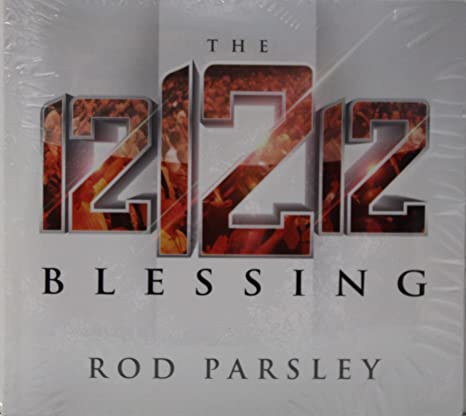 The 2012 elections finalized President Obama in his second term in office. This became one of the reasons we authored Behind the Wall: Obama on Marxism and Pentecostal Identity. All and while, the whole world appeared to be off with the widely spreading Mayan Calendar of untrue “prophecy.”
The 2012 elections finalized President Obama in his second term in office. This became one of the reasons we authored Behind the Wall: Obama on Marxism and Pentecostal Identity. All and while, the whole world appeared to be off with the widely spreading Mayan Calendar of untrue “prophecy.”
In Cleveland, the ministry of Perry Stone announced a move of revival eastward toward the North Carolina mountains where the Church of God had first begun a century ago. As a confirmation, Rod Parsley teamed with a local TN church for the 12.12.12 BLESSING event. We also were able to participate in the 2012 America for Jesus campaign that was comprised by many smaller revival events.

But among anything else, 2012 was a mission test!
With the rising political tensions in Bulgaria, our churches were put into a new demographic predicament. One that was going to overtake the spiritual reality on the Balkans until the new Bill of Confessions was voted by Parliament on the last day of 2019. A president that changed the reality of evangelicals in Bulgaria for the foreseeable feature.
Preparing for this with unwilling anticipation, we were able to print two Bulgarian versions of the Bible in 2012. The 1871 Constantinople Bible which was the first whole Bulgarian translation of the Bible, and its 1940 revision, which was later smuggled in the country and used by evangelical churches under the Communist Regime.
With the end of the year approaching and anticipation growing over the 12.12.12 date we launched our annual Revival Harvest Campaign. In the midst of series of revivals, we were led to make a move that mattered even more. Though, the realization of its vital importance was revealed only seven years later. Looking back now, it is clear how the leadership of the Spirit had prepared it all to the smallest detail. As one final door for ministry unexpectedly opened in 2012, we ended the year preaching in Chichen Itza and though the End of the World did not happen just yet, our last revival event for the year finished with a multitude of miracles.
This book should have been published seven years ago in 2013. Its original subtitle was going to read “7 Years in Bulgaria.” Instead, it took seven years to finish it with all documents, research archives and new cases. Now, it is finally here and it finally reads like a story – not just choppy interviews, deposition documented testimonies or court records, but a story of struggle, strength and solitude. A story of life and a story of us.
1995-96 The establishing of the first Bulgarian Church of God in Chicago and its first split
2000-01 The contracted building of the ministry center for the Central Church of God in Sofia
2002-03 The church split in Southaven and what followed next
2005-06 The post-communist split of the Bulgarian Church of God and consecutive sub-denominations
2010-13 The social media network that cost us millions (of souls)
2016 The vote that forced to kill a church
2019-20 The sale of the ministry center for the Central Church of God in Bulgaria
READ: CONFESSIONS of a Pentecostal Preacher
CONFESSIONS of a Pentecostal Preacher
To Mark Alan
We know not why good people have to die,
but we do know we must tell their story…
Chapter I: Beyond the Church and into God
Be without fear in the face of your enemies.
Be brave and upright that God may love thee.
Speak the truth always, even if it leads to your death.
Safeguard the helpless and do no wrong.
That is your oath.
~Kingdom of Heaven (2005)
Separation of church from politics of false religiosity
The phone rang heavy and long. It was 4 AM in Bulgaria, but I was already up. A friend on the other end of the line was calling from South Carolina with a warning of some bad situation. The following morning, I was going to be contacted by the Director questioning why we were ministering in churches outside of our denomination.
The truth was we had ministered in some 300 local churches across the Balkan country of Bulgaria crossing all denominational boundaries and gathering youth from just about every confession. God had used us not only to reach and minister and to lead, but to step into an untouched spiritual realm, to undertake an unfamiliar ministry paradigm and to approach a brand new dimension of reality where He was to be the center of it all. And we had obeyed without questions. Now it was time to pay the price!
* * *
Our denomination, the one to which I remain both critically loyal and loyally critical, spreads over some five generations. Through its century old existence, the struggles and tension between theology and praxis has been in the center. And there, in the very essence of Pentecostalism itself, while some are always celebrating and being celebrated in the office or temple, others are always pushed in the periphery of normal life, hidden from the world behind closed doors and seeking a much deeper experience with God.
These modern day mystics are not only forgotten, but often forbidden. For their riot for righteousness cannot be conceived, contained and controlled by the religious norms of organized officiality. They speak as prophets to a world they so fervently try to escape from, about a reality that does not exist in the normal believer’s mindset. A stage of spirituality that cannot be preached without being lived in the social existence. And a relationship of God that goes far beyond common relationism and into God himself. That God, Who does not abide in offices and temples, but on the cross outside of the city walls…
But I knew nothing of this until that cold winter morning when the phone rang through darkness of the night. Knowing what is coming, rarely changes what we have done to get here.
7 Years in Bulgaria: CONFESSIONS of a Pentecostal Preacher
by Dony K. Donev, D.Min.
Upcoming Releases for United States (October, 2020)
Prophetic Message of Over 30 Years Brings Peace in 2021
On November 9, 1989, the Berlin Wall, the physical representation of the Iron Curtain was brought down. The standing shoot-to-kill orders of the border guards fell. It meant the end of the Cold War, a war which was waged on political, economic, and propaganda fronts and it meant the end of the Communist Regime in Bulgaria.
Seven months prior to this historic occasion, a Danish journalist by the name of Johny Noer along with his family came to Bulgaria traveling in a Pilgrim Convoy to share one message. The message which was declared throughout Communist Bulgaria was not well received and many threats against his family were given to the point of arresting him, confiscating his passport, separating him from his nursing wife and children and escorting them out of the country via separate routs. The outlawed message was: “LET MY PEOPLE GO!” He literally shouted it from the roof tops of open air events in which there were thousands of desperate listeners searching for hope of liberation. This message shook the spiritual foundations of Bulgaria forever.
Exactly 25 years later, our ministry invited brother Noer and his wife to Bulgaria again to proclaim the same message: “LET MY PEOPLE GO!” By miracle, we were successful in getting them into the country even though they had been blacklisted and were not permitted to return. By miracle, we received permission to hold gatherings on election day and by miracle, the funds came just as needed to rent the largest auditorium in the city. The year was 2014 and during one of the many sermons he preached during this revival crusade, along with declaring to “LET MY PEOPLE GO”, a prophetic message was given which was not fully understood until this past year. The message, given in broken English translated into Bulgarian, was exact details of the Corona Virus Pandemic. Astonished by the Word of protection for God’s people, we shared this video clip on social media in 2020. But what astounded us the most was that the video was blocked for containing false information about Covid-19. Over 30 years later this message is still being outlawed by the powers of darkness.
In Exodus 5, when the Israelites brought the words from the Lord and asked to be let go and be able to worship, Pharaoh said, “Who is the LORD that I should obey his voice and let Israel go? I do not know the LORD, and moreover, I will not let Israel go.” But regardless that “Pharaoh” does not know the Lord and forbids worship to the point of arrest and tries to keep God’s people behind the Wall, there is hope in the next part of the story. There is God’s promise for deliverance, the plagues and having to make bricks without straw will be in the past. And no matter the modern-day attempt at censorship, manipulative propaganda or shoot-to-kill silencing orders, we will shout it from the Mountain Tops, “LET MY PEOPLE GO!” We will worship even if we have to go to the wilderness, wherever or whatever that may be. We will shake the spiritual foundations of this country once again.
In the beginning of 2020, the Lord spoke to us what the verse of the year would be for 2021. It is only now that we fully understand its significance. When Jesus appeared to the disciples after His resurrection in John ch. 20, they were hiding behind closed doors in fear. But Jesus came, stood among them and told them “Peace be with you!” This first command for peace and presence calmed fears restoring social order and justice. And in 20:21, Jesus told them again, “Peace be with you”. This second command was a strong imperative salutation to “GO”. Then He breathed on them to receive the Holy Spirit and sent them out as the Father had sent Him.
This year, we are not to live in fear behind closed doors. We shall receive the Resurrecting Power of the Holy Spirit and go out. It is this Power which shall be our covering which Johny Noer spoke of in 1989 and 2014. Today, we have hope of liberation from any Wall, Curtain, Regime or Order. Jesus is amongst us standing undefeated. In 2021, may peace be with you as you stand up to go out declaring “LET MY PEOPLE GO” and do not take no for an answer.
January 1, 2021 Cup & Cross Ministries International, John 20:21
https://www.youtube.com/watch?v=oO3f3vvZSeY
Can Christians celebrate Hanukkah?
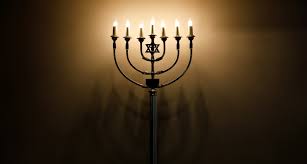 Hanukkah, the Jewish Festival of Lights, began Sunday, a holiday which starts on the 25th of the Jewish month of Kislev and lasts for eight days. In the Gregorian calendar it begins December 2 and concludes December 10 in 2018. Hanukkah is also known as the Feast of Dedication, and while it is not written about in the Old Testament, it was an observance Jesus took part in during his earthly life.
Hanukkah, the Jewish Festival of Lights, began Sunday, a holiday which starts on the 25th of the Jewish month of Kislev and lasts for eight days. In the Gregorian calendar it begins December 2 and concludes December 10 in 2018. Hanukkah is also known as the Feast of Dedication, and while it is not written about in the Old Testament, it was an observance Jesus took part in during his earthly life.
“At that time the Feast of Dedication took place at Jerusalem. It was winter, and Jesus was walking in the temple, in the colonnade of Solomon,” John 10:22-23 recounts.
The holiday is fundamentally about the miracle of God being with the Jewish people during a time of great hardship and persecution.
THANKFUL in 2020
10 Reasons to Be Thankful in the Midst of COVID-19 Pandemic
- Families spend more time together at home and in nature
- Gas prices have decreased
- Eating around dinner table has replaced going out to restaurants
- Prayer and return to the Faith has increased
- Homeschooling has become popular
- Open-air church meetings are coming back
- Communities are rallying together to help one another with less individualism
- Politicians are working more cohesively
- We are resourceful and not wasteful appreciating small things and basic necessities
- We are going back to the basics of a slower more grounded lifestyle



